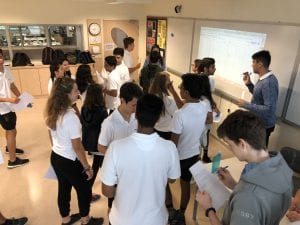How does intertextuality contribute to meaning within texts?
Intertextuality is the relationship that two texts have with each other, often times the use of intertextuality enhances the meaning and range of interpretations that can be gained from a single text. The use of intertextual references is very dependent on a reader’s knowledge and understanding of both the context and ideas of the text being referenced. An author may choose to use a specific text to reference because it is widely known by a range of audiences or has a significant meaning to their target audience. Intertextual references are often grounded in a significant aspect of culture or religion for an author’s intended audience. For example, in Carol Ann Duffy’s The World’s Wife, the poem “Little Red Cap” has clear intertextual references to the old folktale of Little Red Riding Hood. Given that the old folktale is about a little girl riding through the woods to see her grandmother and her chance encounter with a wolf, the folktale has many connotations with the ideas of innocence and naivety. However, Carol Ann Duffy uses the reader’s understanding of these connotations to create a greater level of nuance to her own version of the story, putting greater emphasis on the ideas of a loss of innocence and adventure as one grows older. Carol Ann Duffy is able to use this old folktale and its connotations to give her own text a deeper meaning without having to explicitly explain everything because the reader already has an understanding of the text being referenced. Meaning within texts can be greatly enhanced with the help of intertextual references and can make a reader resonate more strongly with a text. The cultural, religious, and political significance of a text often plays a large role in either strengthening or weakening a reader’s appreciation of a text, but it almost always contributes to the intended and unintended meanings of a single text.
What is gained and lost through the use of intertextuality?
Intertextuality is a powerful tool in literature that allows an author to create another level of meaning in their text, however, it can also result in the creation of many unintended interpretations and understandings depending on a reader’s personal context. Intertextuality often contributes to a reader’s understanding when they know about the text being referenced. For example, in Obama’s eulogy for a Charleston pastor following a mass shooting, he made many intertextual references to god and the bible. These references were effective given that his main target audience were citizens of the United States, who are mostly of Christian upbringing or have lived in the culturally Christian United States. By using these biblical intertextual references, Obama was able to provide a sense of hope and security to the viewers following the tragedy, because their interpretation of these biblical references is associated with what Christianity means to them. Similarly, people living in the United States who are not Christian or familiar with Christian values and ideologies would not have the same level of appreciation or the same interpretation as Christians. What is lost is a sense of connection between Obama and the citizens of the United States who are of different religions and cultural backgrounds. Their interpretation of his speech would most likely result in an understanding that was unintended by Obama. Intertextuality can provide many things to a text, however, it is important to consider the context of a text’s creation before choosing which texts to reference, as intertextuality can contribute to both intended and unintended interpretations of a text.
